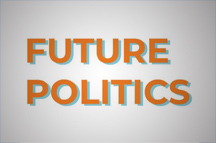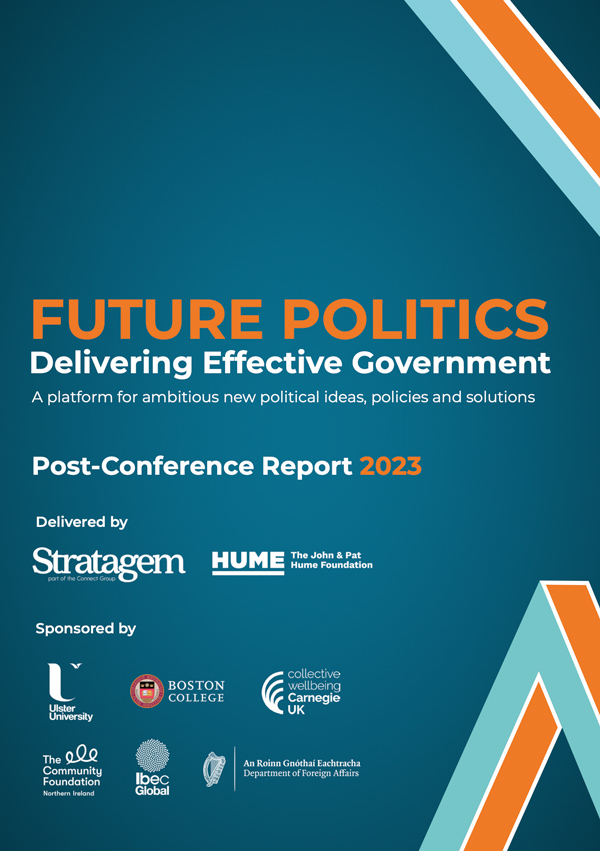Future Politics, a partnership between the John and Pat Hume Foundation and political consultancy Stratagem, has published a new report about how Northern Ireland moves towards better planning, decision making and delivery in government.
There has been a lot of chat about what the first 100 days has and hasn’t achieved since the restoration of the NI Executive and Assembly. While milestones are important, the irony is not lost on bemoaning the emphasis on the PR optics that came thick and fast from the First and deputy First Ministers' office, whilst using the PR opportunity that a nice round figure like 100 days presents.
Rome wasn’t built in a day and nor was the Executive ever going to deliver in 100 of them and whilst it is important to hold our politicians to account, a strong dose of realism is important in managing the expectations of organisations and of individuals across Northern Ireland.
The institutions that our politicians are working within continue to limit their ability to deliver. The compromises of a coalition, agreeing on key priorities and how to fund them, can feel like wading through treacle – and that’s a more positive interpretation than some have written and spoken about in the last week suggest.
The more critical will be drawn to the “dysfunctional system” narrative that Brenda Campbell KC articulated in the devastating summing up she delivered on behalf of the bereaved families at the Covid Inquiry.
The context is both timely and relevant here; before we look at the flaws in the system, at best there has been a lack of appetite to address the weaknesses in the system, and at worst, exploitation of a broken system to advance agendas.
Both perspectives will only take you so far. Whatever the analysis, one thing is clear: it needs to change, and that’s the basis on which the Future Politics project in partnership started three years ago.
This week we published a report following our Future Politics conference that took place at the end of last year. Drawing on the insights and discussions that took place over the course of a day in, there are recommendations on how we can create a more sustainable and effective government, primarily focused on optimising existing structures.
Emerging from the event and the report are two distinct themes that underpin the functioning of politics and government here which can be defined as:
1. Institutional architecture;
2. Relationships and engagement.
Looking at institutional architecture, the Executive, Assembly, and their relationships with both London and Dublin have been challenged to breakpoint, with the past eight years being characterised by more dysfunction than delivery.
Brexit accounts for some of the damage, however the siloed structure of the Executive fused with an ambition – and critical need – to develop a more collaborative approach to policy delivery is contributing to some of the paralysis that we are seeing in today’s Executive. We need only look at the response to Lough Neagh to understand this.
Is this the price we pay for powersharing? Not necessarily. There are things we can do to improve this, such as introducing a Statutory Duty to Cooperate, aligning Community Plans across local government with the Programme for Government, as well as a more strategic approach across UK and Irish policy interventions.
The current lack of formal mechanisms and coordination between these different tiers is inefficient and clunky and so there is an opportunity to streamline and optimise how the different parts of the system fit together. This would be particular timely and helpful when it comes to how public finances are allocatedand public services delivered.
The other key part of the puzzle is the relationships that exist within the institutions, and how our politicians are supported to navigate what is a post-conflict landscape that is still dealing with the legacy of the past. How is the civil service equipped to meet our evolving political, economic and social challenges? What systems and structures are in place to help them deliver the transformation that is referenced in so many strategies developed over the last 25 years?
Unpopular though it might be to suggest we should do more to support politicians when an easier thing to say – and indeed a very valid thing to say – is that our politicians should be doing more to support the people they represent. But this isnt a binary choice. There is no going past the fact that their capacity to legislate determines how effective they are in their role. Just as important is capacity to set strategic direction and ensure implementation a job for politicans and civil servants alike.
Being an MLA or MP can be a lonely job, and it is pretty much impossible to ever get to the bottom of the to do list. Like in any job, most are driven by a desire to deliver and see results, but in this role, it is unlikely that you will ever please everyone.
And there is little training on the job, save a couple of introductions to the various offices of the Assembly. There is a need for more ongoing programmes such as those delivered by the Centre for Peacebuilding and Democracy, giving space to build relationships on a cross-party basis and indeed potentially cross-jurisdictional; there is much we can learn from the experiences from other parts of these islands, particularly the devolved regions.
Another key aspect of the report considers how policy making, and relationships, could be improved through formal mechanisms that bring external expertise and ideas into the room. From business to the VCSE sector, so many people working outside of the system have so much insight and experience to bring to the table, but collaboration hasn’t developed into something which these sectors consider meaningful to date and so there is an opportunity to develop this.
There are many other recommendations in the report, but the most important take away we want to lodge is the need to continue to create space for more reflective conversations around how to improve the sustainability and effectiveness of our politics.
We can do better, but the current set up is inhibiting that delivery, and as financial circumstances increasingly demand creative solutions, now is the time to look not just at the symptoms of the problem, but the root causes.
by Anna Mercer, Deputy Director, Stratagem















